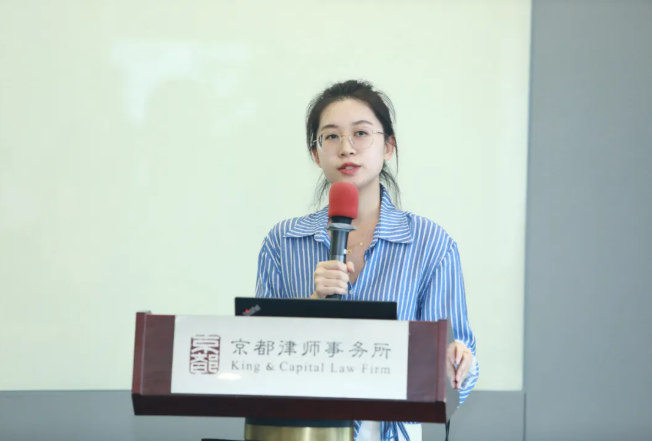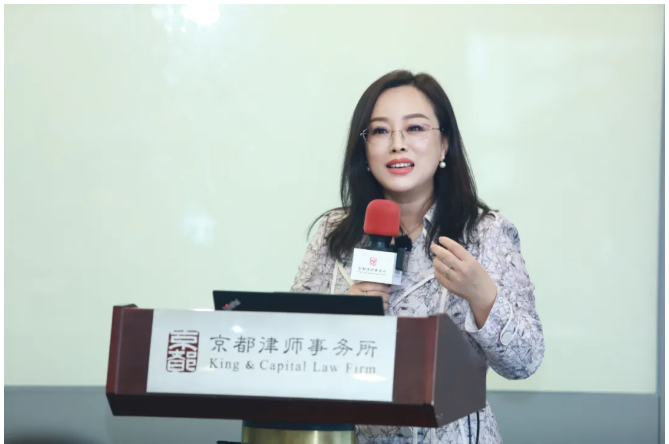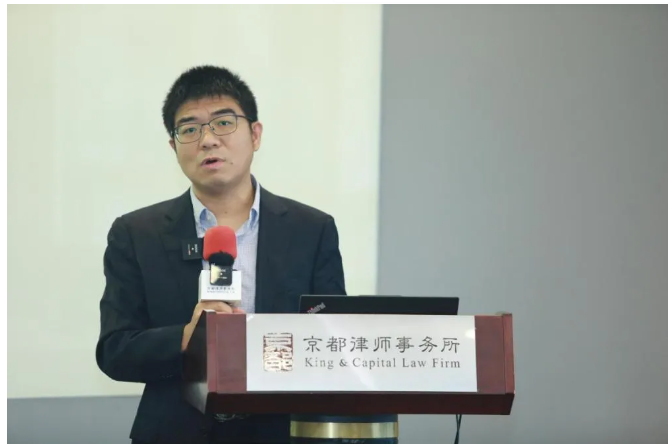On September 22, 2025, the fifteenth issue of the series of activities of “Criminal Case Thinking and Defending” of the Criminal Department of Beijing King&Capital Law Firm was successfully held. This activity focuses on the hot and difficult issues in the field of food and drug, environmental resources, intellectual property rights (hereinafter referred to as the “environment, food, medicine and knowledge”) crimes, and invites senior lawyers and authoritative experts to deeply dismantle the core points of defense. The event took the form of combining offline seminar and online live broadcast, with Mr. Tang Jianbin, Senior Partner of King&Capital Law Firm, as the guest speaker, Mr. Zhang Sijia of King&Capital Law Firm, and Mr. Zeng Wenyuan, Associate Professor of the People's University of Public Security of China, as the guest speakers.

Host GaoYuMan lawyer pointed out in the opening of the activity, ring food and drug know crime involves people's livelihood security and market order, in recent years presents the crime means hidden, new type of characteristics, put forward higher requirements for the professionalism of the criminal defense. This activity aims to provide precise guidance for the first-line defense work through practical case analysis and theoretical in-depth interpretation, and help to enhance the professional level of criminal defense in the field of food, drug and environmental knowledge.
Mr. Tang Jianbin:
Disassembling the key nodes in the defense of food, drug and environmental resources crimes

As the director of the Kyoto legal research center, Tang Jianbin, combined with nearly 20 years of practical experience, to “food and environmental crime defense core issues analysis” as the theme of sharing, around a number of controversial focus on systematic dismantling.
In the food crime defense, Tang Jianbin lawyer to a processing type production, sales of toxic and harmful food case as a starting point, in-depth discussion of the commissioned processing mode of the crime and amount calculation. Entrusted processing in the legal relationship between the processor and the commissioner is the key to the defense of the definition of the legal relationship - the processor is only the implementation of the production of behavior and did not participate in the subsequent sales, the delivery of goods to perform the behavior of the processing contract, rather than sales, the amount of the crime should be calculated according to the cost of processing and reasonable remuneration, rather than the commissioning party's final sales amount, the distinction between conviction and sentencing have a direct impact. This distinction has a direct impact on conviction and sentencing.
As for the problem of identifying non-catalog illegal substances, Mr. Tang Jianbin proposed the double review standard of “equal attributes + degree of harm”. Combining the determination process of Metformin Hydrochloride in the “Sunshine 100 Case” and the typical case of the Supreme Prosecutor's Office in 2023, he emphasized that the substances outside the catalog need to be assessed by experts to prove that they have the “same core pharmacological effects” or “the same degree of harm” as the substances in the catalog. It is emphasized that substances not on the list need to be proved by expert assessment that they have “the same core pharmacological group” or “the same degree of harm” as substances on the list, and that there is room for defense based on the similarity of chemical structure. Illegal addition of the incrimination of the substance content, even if there is the act of adding, if the content is very low and does not reach the standard of harm, can be based on the “crime is significantly less serious” to fight for non-prosecution.
In the evidence questioning session, Tang Jianbin focused on analyzing the test report and the administrative opinion of the questioning strategy. He proposed that the test report as a “quasi-appraisal opinion”, need to focus on reviewing the qualification of the organization (CMA certification and scope of business), the qualifications of the inspection personnel (equipment operation qualification and professional background), the chain of custody of the test material (seizure, seizure, the same nature of the test) and the applicability of test standards. For the administrative determination of the opinion, he made clear that it belongs to the Criminal Procedure Law Judicial Interpretation of Article 100 of the “specialized knowledge of the report”, which must contain test data, expert assessment and administrative determination of the conclusion of the three parts of the lack of expert participation or test data can be claimed not to be used as evidence.
In the section of drug crime and environmental crime, Mr. Tang Jianbin focused on the legal characterization of APIs and the behavioral definition of illegal mining crime. In response to the controversy over APIs, he combined the case of an anti-cancer API in Shanghai with a similar practical scenario of “I am not the God of Medicine”, pointing out that after the revision of the Drug Administration Law in 2019, although APIs are not explicitly included in the definition of drugs, they have therapeutic functions and are sold as drugs, which can be recognized as drugs, and it is necessary to differentiate between “medicinal function” and “drug function” in the defense. The defense needs to distinguish the boundary between “medicinal function” and “administrative regulation”. As for the crime of illegal mining, he took the case of the sale of sand and gravel left over from the leveling of a mountainous area as an example, and emphasized that the core of the crime is the illegal mining behavior, and if the mining behavior has a legal basis (such as the approval of the building construction), the subsequent illegal sale only constitutes an administrative violation, and should not be punished by the conviction of the crime of illegal mining, and the relevant viewpoints have been supported by a number of judicial cases.
Mr. Zhang Sijia:
The Determination of the Amount of Illegal Business and the Amount of Illegal Income in the Crime of Counterfeiting Registered Trademarks

Mr. Zhang Sijia believes that in the field of environmental, food and drug defense practice, we should strengthen the use of the exclusion rule of lack of evidence of relevance, for the identification opinion and test report of unknown origin of the test material, we should be good at the relevance point of view to put forward its lack of evidential capacity, and we should actively apply the application of the expert witness system in the court. The case involving ring food and drug know crime is highly specialized, when facing the judgment of specific danger, the defender due to the limitation of their own knowledge structure, it is often difficult to put forward accurate professional opinion. Therefore, Zhang Sijia mentioned that lawyers to achieve effective defense, we should make full use of the existing system rules, and actively apply the expert witnesses in court, so as to effectively prevent the prosecution (broadly speaking, the procuratorate and public security organs) in the closed pre-trial procedures to guide or induce the appraisal institution to make the conclusion of the appraisal which is not in line with the objective facts.
Mr. Zhang Sijia believes that in the judicial practice of the crime of counterfeiting registered trademarks, the amount of illegal business operation and the amount of illegal income are the core criteria for defining crime and non-crime, measuring the severity of the circumstances, and determining the range of sentencing. However, there are many identification problems in practice: some cases confuse the boundary between the calculation of the amount of illegal business operation and the amount of illegal income, and the application of confusing standards for the determination of the value of the infringing products that have been sold and those that have not been sold; in particular, under the network sales scenario, the false transaction data generated by “credibility brushing” interferes with the determination of the true amount; when refurbishing genuine old goods, the actual selling price of the infringing products is different from the actual selling price of the infringed products. When refurbishing genuine old products, the actual selling price of infringing products differs significantly from the middle market price of infringed products, leading to frequent disputes over the calculation of the amount. These problems not only affect the accuracy of conviction and sentence, but also may lead to different judgments in the same case. In this regard, Mr. Zhang Sijia started from the definition and difference between the amount of illegal business and the amount of illegal income, the typical disputes and solution paths in the judicial practice (whether the data of “credit brush” in the network sales is counted in the amount, the determination of the amount of refurbished genuine old goods, and the determination of the amount of the value of the infringing products that have not been sold), and the key points of the determination of the amount (whether the amount of The key review points for the determination of the amount (whether the basis is directly related to the infringing behavior, the review of the legality of the calculation standard: whether to follow the “stepped” determination rule, and the review of the determination of unsold products: whether to include “semi-finished products that can be assembled into finished products”) are combined with the provisions of the law, the theoretical consensus and the typical cases to clarify the determination of the amount of the two categories. Cases, clear two types of amount of determination rules.
Finally, Mr. Zhang Sijia said that in the crime of counterfeiting registered trademarks, the determination of the amount of illegal business operation and the amount of illegal proceeds should be closely related to the “substantive justice” and the “standard of evidence”: the former needs to comprehensively evaluate the scale of infringement, prioritize the actual selling price and the real transaction data, and avoid excessive reliance on the market intermediary, and avoid the use of the market intermediary. The former needs to comprehensively evaluate the scale of infringement and prioritize the actual selling price and real transaction data, so as to avoid over-reliance on the mid-market price, which leads to an inflated amount; the latter needs to accurately calculate the infringement profits and strictly distinguish between “reasonable costs” and “illegal expenses”, so as to prevent omission of deduction or inappropriate deduction.
She said that in judicial practice, it is necessary to combine complex scenarios such as online sales and refurbishment of used goods, to exclude false data through substantive examination of the evidence chain, and to unify the determination standards, only in this way can we ensure that the cases are accurately characterized and appropriately sentenced, so as to not only crack down on the crime of trademark counterfeiting and safeguard the lawful rights and interests of IPR holders, but also to protect the defendant's legitimate litigation rights and to achieve a balance between judicial fairness and efficiency.
Associate Professor Zeng Wenyuan:
Judicial Application of Administrative Determination from Administrative Law Perspective

Associate Professor Zeng Wenyuan, Deputy Director of the Food, Drug and Environmental Crime Research Center of the People's Public Security University of China (PPSU) and Associate Professor of the PPSU, conducted an in-depth analysis of the administrative determination issue from the perspective of the convergence of execution and punishment, providing theoretical support for practical defense.
Taking a number of cases of illegal addition of nafil derivatives as examples, Associate Professor Zeng Wenyuan revealed the current practice of expanding administrative determination. He pointed out that in such cases, the new substances could not be detected by non-statutory testing methods, and the administrative authorities issued opinions on the determination through expert argumentation, which was then used as the basis for criminal conviction. Although this practice improved the efficiency of the crackdown, there was the problem of fuzzy legal boundaries.
From the level of jurisprudence, Associate Professor Zeng Wenyuan put forward three core views: First, the scope of administrative determination should be strictly limited to cases with obvious incriminating features, such as cases with clear legal prohibited substances, and the determination of the harm of difficult substances belongs to the issue of legal interpretation, and should not be directly defined by the administrative organ through expert opinions; second, the testing method should follow the principle of legalization, and the non-food safety standards of laboratory testing can be used as the basis of risk assessment, not directly as the evidence for criminalization; second, the testing method needs to follow the principle of legalization. Secondly, the test method should follow the statutory principle, and the laboratory test of non-food safety standard can only be used as the basis of risk assessment, and cannot be directly used as the evidence of conviction; thirdly, the administrative opinion should be subject to judicial examination, and its nature belongs to the “report of specialized knowledge”, and it should not be used as the basis of decision-making if the expert has not appeared in court.
In particular, he warned that the over-expansion of the administrative determination may deflate the statutory standard system, and suggested that the scope of its application should be clarified at the legislative level, and that the standards of evidence should be differentiated at different stages of the criminal proceedings in judicial practice, and that the administrative determinations at the prosecution and trial stages should be strictly controlled, so as to avoid replacing judicial determinations with administrative judgments.

Follow-up Activity:
The series of activities of “criminal defense” is a column specially set up by the Criminal Department of King&Capital Law Firm to strengthen internal communication, improve the practical ability of lawyers in criminal defense, and enhance the influence of the firm's criminal defense brand. The column aims to promote the exchange and cooperation between the head office of Kyoto and the branch, the firm and the peers, experts and scholars, between the departments within the firm. The “Criminal Defense Talk” activity will be held once a month, and the next activity will continue to invite professionals to share and discuss.




